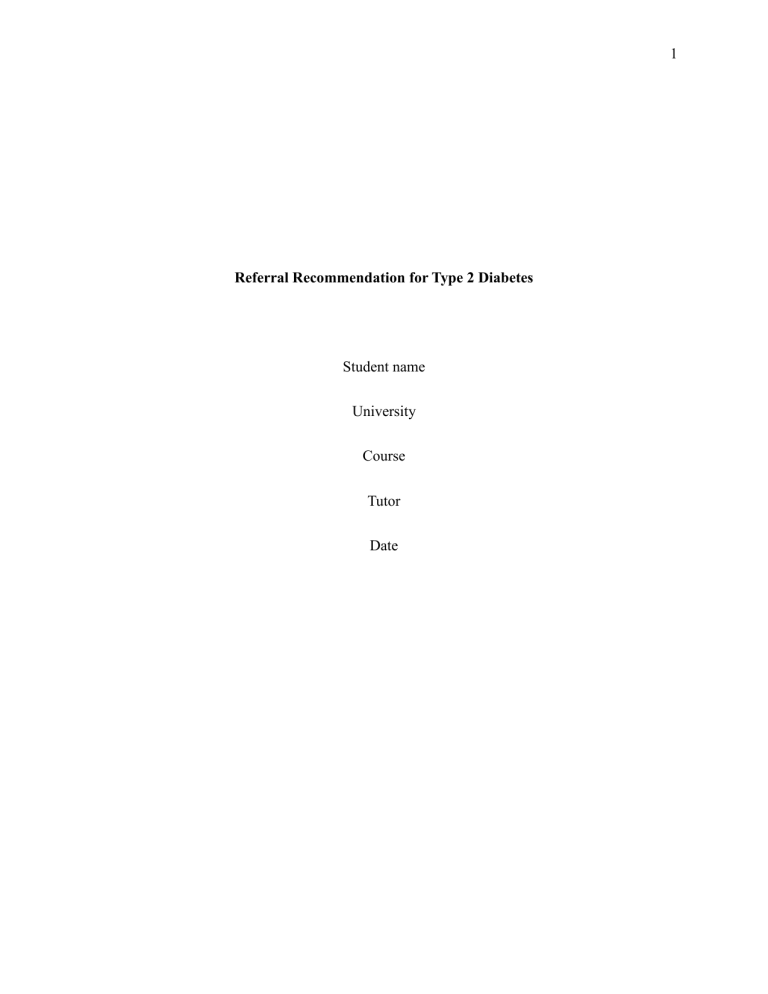
1 Referral Recommendation for Type 2 Diabetes Student name University Course Tutor Date 2 Referral Recommendation for Type 2 Diabetes The case of the patient with Type 2 diabetes is one that requires a wide range of specialized care due to the different aspects of its implications. A multidisciplinary team (MDT) would be required to deal in its diagnosis and management of related complications such as those of the eyes, feet, mental distress and physical wellbeing. This referral recommendation will provide details on what healthcare practitioners will be required in the MDT and what skills, knowledge, and expertise will be required from them and then explain my role as the general health professional. One professional that will be required for this Type 2 Diabetes case is an endocrinologist who has expertise in the endocrine system. The specialist will pay and important role in the MDT by providing first hand evaluation of the patient’s insulin levels while providing communication on the patient’s progress (Tan et al., 2020). Additionally, the endocrinologist will play a vital role in providing insulin therapy and recommending the appropriate medication to help with the patient’s metabolism (Tan et al., 2020). Additionally, a registered dietician will be required to provide insight into the patient's dietary requirements in managing Type 2 Diabetes. The dietician's role will be to provide personalized meal plans to help the patient manage the blood sugar and provide recommendation for foods that boost insulin production and reduce ionic imbalances (Jing et al., 2018). A podiatrist will additionally be required in the MDT due to their specialization in foot complication treatment. Their presence will term beneficial in providing foot care to the patient susceptible to foot and skin infections, including abscesses and gangrene, which pose a significant threat to the patient's recovery (Bandyk, 2018). An optometrist should also be included in the MDT due to the known eye complications presented by diabetes. The optometrist 3 should provide specialized eye care for the patient by diagnosing complications such as diabetic retinopathy and offering solutions to prevent its advancement (Simó-Servat et al., 2019). A certified diabetic educator (CDE) will also be critical in the team to effectively break down the treatment plan to the patient in a manner they can understand. The CDE will also provide education to the patient and their relatives on how to manage the diabetes and teach them how to administer insulin as well as other medications. Additionally, a clinical psychologist in the MDT would benefit the patient by talking them through their psychological trauma of living with diabetes. The psychologist should be able to evaluate the patient’s mental distress and provide exercises they can engage in to sustain their mental well-being (Jing et al., 2018). My role as a general health professional in the MDT would be to connect the selected professionals, the patient, and their families to keep everyone engaged in their active role in the patient's diabetes management (Tan et al., 2020). I would additionally take charge of arranging and managing the patient’s appointments and following up on their treatment through communication with team members. Effective communication can be achieved by first explaining everyone’s role in the MDT and clearly stating the expectation from every one for the patient recovery. Additionally, each team member would have access to the electronic health record (EHR) of the patient to ensure they are familiar with the treatment plan to reduce errors while also having clear communication through mediums such as emails and regular team meetings to discuss progress and listen to feedback. 4 References Simó-Servat, O., Hernández, C., & Simó, R. (2019). Diabetic retinopathy in the context of patients with diabetes. Ophthalmic Research, 62(4), 211-217. Jing, X., Chen, J., Dong, Y., Han, D., Zhao, H., Wang, X., ... & Ma, J. (2018). Related factors of quality of life of type 2 diabetes patients: a systematic review and meta-analysis. Health and quality of life outcomes, 16(1), 1–14. Tan, H. Q. M., Chin, Y. H., Ng, C. H., Liow, Y., Devi, M. K., Khoo, C. M., & Goh, L. H. (2020). A multidisciplinary team approach to diabetes. An outlook on providers' and patients' perspectives. Primary Care Diabetes, 14(5), 545–551. Bandyk, D. F. (2018, June). The diabetic foot: Pathophysiology, evaluation, and treatment. In Seminars in vascular surgery (Vol. 31, No. 2-4, pp. 43-48). WB Saunders.
